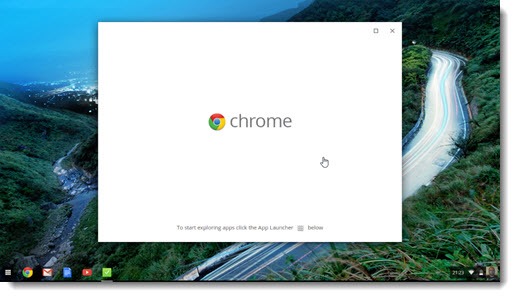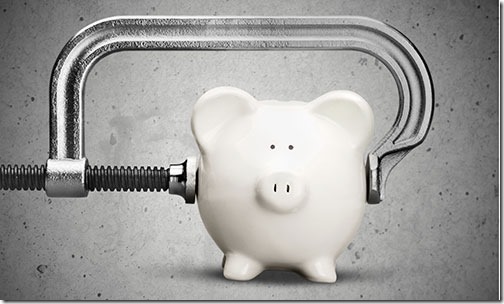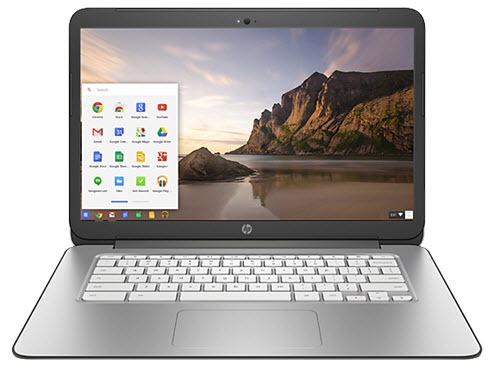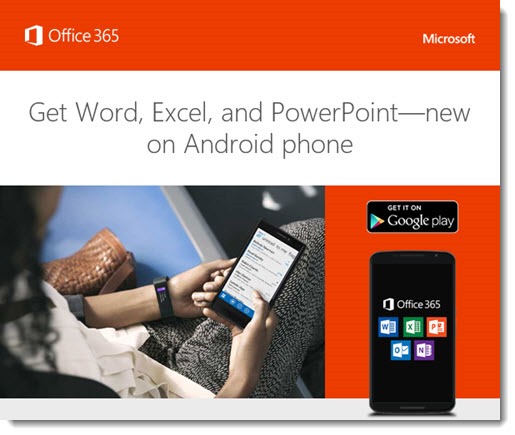
I’m not good at predictions. Tim Cook, the CEO of the largest company in the world, called me a twit during a global presentation a few years ago because I made a poor prediction. (Seriously. Here are the details.) I made a commitment then to avoid sweeping generalities about the future.
It’s time for a sweeping generality. I think we’re on the verge of huge disruption in the technology industry, and most people don’t see it coming.
The future is full of Chromebooks.
Chromebooks are laptops that don’t run Windows. They run Chrome OS, a simple operating system from Google that is mostly the Chrome web browser plus a few cool tricks. Today you can browse the web, read email, watch Netflix, and run a limited selection of apps on a Chromebook. If you’re new to Chromebooks, this article has more background info.
Sometime in the next 3-6 months – maybe in time for holiday shopping, maybe early in 2017 – Google will make it possible to run Android apps on Chromebooks. Everything that you’re currently running on your Android phone will run on a Chromebook. Android apps are designed to be used with fingers; Chromebooks with touchscreens will start appearing within a month or two and quickly become the default.
You might buy one. I’ll probably buy one or two, maybe give them as Xmas presents. Your mom might buy one.
A tsunami can arrive as a deceptively small flow of water. It builds and builds in intensity until it is a huge unstoppable force.
Chromebooks are hitting the industry like a tsunami. It has already begun: Chromebooks are taking over the US education market and Chrome OS quietly overtook MacOS this year to become the second most popular computer operating system in the US. But that’s only the beginning of the unstoppable force that will take us into a post-Windows world far more quickly than anyone expects.
My prediction: sales of Chromebooks will skyrocket starting later this year, perhaps surpassing sales of Windows computers before long.
There are four things that will make this happen.
• Chromebooks have matured into very nice laptops – attractive, high quality construction, high performance.
• Chromebooks are very, very simple to operate.
• You will be able to run the Android version of productivity apps (like the Office programs) on Chromebooks.
• Chromebooks are cheap.
It’s all about the price. None of the rest would matter much if Chromebooks cost the same as Windows laptops. But they don’t, and that changes everything.
Chromebook quality has improved
More and more Chromebooks have the same sleek lines, light weight, and quality construction that you find in MacBooks and the best Windows laptops. Screens run at reasonably high resolutions; 1920×1080 screens are becoming commonplace. There will always be low-end Chromebooks made of plastic with poor keyboards, just like the terrible Windows laptops sold on the lower shelves at Walmart. Mostly, though, Chromebooks will be attractive and well-made.
Chrome OS uses less power than Windows. Battery life on Chromebooks routinely runs 12 hours or more. Think about that the next time you’re watching the battery indicator on your Windows laptop.
When the time comes and you shop for a Chromebook, buy a high resolution screen and absolutely do not buy a Chromebook without a touchscreen. There will be a flood of good choices in time for holiday shopping.
Chromebooks are simple

To borrow a phrase from Apple: Chromebooks just work.
One of the important reasons we started using phones instead of computers as our primary technology devices is that Windows computers are difficult. They’re unreliable. They’re never up to date. They’re constantly changing and things stop working for no reason. In short, computers are just too hard to use, and it isn’t your fault.
Chromebooks boot instantly. They’re always secure and up to date. Since everything is stored online, you can replace a Chromebook and instantly go back to work with your apps and your files – no time-consuming migration or setup required.
I installed Chrome OS on an old laptop. You could too, if you want. Neverware (http://www.neverware.com) distributes a free version of Chrome OS that you can install from a USB stick.
The installation only took a few minutes. I was at a desktop almost immediately.
My first instinct was to dismiss it. There was nothing there! Just a browser and a few apps. There were no settings, no control panel, no way to dig around under the hood to troubleshoot networking components. Just a simple, elegant screen with a web browser.
Then I did a double-take. That’s the point. All the complexity has been stripped away. Chrome OS was built up from a simple foundation and has more in common with phones than with computers – and by any measure, we prefer phones to computers these days.
You can’t do everything on a Chromebook that you can do on a Windows PC. Businesses will rely on Windows PCs for many years. Gamers will continue to use Windows. But for most people, Chromebooks do enough to meet their technology needs.
Chromebooks will be able to run productivity apps
One of the shortcomings of today’s Chromebooks is that they can’t run the Office programs – Word, Excel and Powerpoint.
Android apps are coming to Chromebooks.
Guess what runs on Android?
The Android versions of the Office programs are designed for tablets as well as phones. They’re not as full-featured as the Windows versions, which means they’re simpler to use. Most people won’t notice that anything is missing. They produce files in the standard Office file formats – .DOCX, .XLSX, .PPTX. There’s every reason to expect that they will run beautifully on Chromebooks.
All of a sudden Microsoft’s efforts to make Office available on every platform has an unexpected side effect: Chromebooks are legitimized as true productivity devices. This may deal a killing blow to low end Windows laptops.
Chromebooks are cheap

Chromebooks cost one-third to one-half as much as a comparable Windows laptop. You can get a reasonable Chromebook with a 13” screen for $200-$300. The high end business quality Chromebooks will be $500-$600.
People always buy far greater quantities of things that are cheaper but good enough. It’s obvious and we see it play out over and over.
The best example also tells you what to expect in the laptop market: when you measure by the number of units sold, more than 80% of the smartphones sold in the world are Android phones. They’re cheaper than iPhones. That’s the only reason but it’s enough to make people prefer Android by a 6-to-1 margin.
Sales of Windows computers are in freefall. Chromebooks are going to be an obvious alternative in the low-end computer market. The low-end might not make the biggest profits (Apple sucks almost all the profits out of the smartphone market with its 14% iPhone market share), but the low-end sells the most units.
The game is about to change. The tsunami has already started to come onshore. If I’m right, by Xmas there will be a Chromebook in every pot, and two Chromebooks in every garage, or something like that. And if I’m wrong, well, maybe Google CEO Sundar Pichai will call me a twit.



Very nice article! …
Thanks! I wrote some articles recently about Chromebooks, trying to help Windows users make sense of this brave new world. Check them out too!
Google promised to have an update relatively soon for the 2017 chromebooks to incorporate the Google Play Store & Android Apps – hopefully they hurry up with that because it’s a HUGE selling point with people.
Laptops that work like their phones but better – that’s a huge promise but one needing to be delivered on.
I think one of the biggest aspects of Google that I enjoy – they don’t oversell, it seems. I’m not barraged with google ads like I am with iStuff. But that might also be my feed and my life – for Google advertising in my life it’s subtle. It’s there, but it’s more like: “Yep, we are here, and we are mostly awesome, but look – we are slowly taking over the world, one technology at a time”. And since people see Google SO often, they already seem to have ingrained themselves in people’s minds. – Just bought Tim’s daughter a Chromebook. LOTS of positive reviews from parents/husbands saying they bought their kids or wives chromebooks and they’re in love with them. Could use improvement, as all things do, but otherwise they are super happy.
It’s interesting that you say that on the same day that reports appear about Microsoft’s intrusive advertising for OneDrive embedded in File Explorer. http://www.theverge.com/2017/3/9/14872464/windows-10-onedrive-ads-inside-file-explorer It will be really interesting to see the landscape change if Google can bring a good Android experience to Chromebooks. And Google just announced some very smart things with Google Drive yesterday – I’ll write about those next week. The world is changing!
I agree, I find the lack of buzz weird too. Chromebooks are clearly the new thing, I run a business and have totally moved over to an Acer R11 Chromebook from a Windows machine and have not looked back since, they are awesome. Why aren’t Google making more noise?
I’m guessing a bit. It seems Google hasn’t quite finished the Android integration and a lot of things are paused waiting for it. People are a bit distraught that the new Acer Chromebook R13 didn’t ship with the Play Store turned on, for example. No one seems sure if it will be a few more weeks or a few more months. Check out https://chromeunboxed.com/ – they’re on top of this stuff. My Chromebook R13 ran into a bug on its first update out of the box – the wifi was disabled, never to turn on again. I saw other references online to the same problem and decided to change gears, so now I’m waiting for a Lenovo Thinkpad 13 with touchscreen, which at this moment also doesn’t have Play Store support. But it will soon! I hope. I’m wondering if Google will miss a fair amount of momentum it could have gained during the holiday shopping season. http://www.brucebnews.com/2016/10/chromebooks-gain-but-google-isnt-talking/
To Melissa: Step away from the keyboard!
(grin) Incidentally, the latest rumors are that Google will release the final bits in October to allow Android apps to run on Chromebooks. That might be at Google’s product event on October 4, although that’s already got a crowded docket with new Google Pixel phones, a mesh wireless network device, and a few other things. Acer has already announced a new Chromebook with touchscreen for October and with luck there will be a lot of other announcements when Google is ready to throw the switch. Not long now until things get very interesting . . .
Are pre-installed Windows 10 Chromebooks a good buy?
08/12/2016 Wired Magazine, “Attention, College Students: Chromebooks Are About to Get Awesome”
“HERE’S SOME UNHELPFUL back-to-school advice: Don’t buy a laptop. Borrow one, steal one from a family member, buy a piece of junk for 40 bucks on Craigslist. If you can find a way to wait a couple of months before dropping serious coin on a new clamshell, you’ll be glad you did.
“Later this fall, Apple’s almost certainly going to release a new MacBook Pro, which is desperately in need of a revamp. And there will be Windows PCs practically falling from the ceiling—maybe even a few made by Microsoft itself. But the real reason to hold off on your purchase is to wait for the new breed of Chromebooks that are on their way.
“Right now, there are lots of good Chromebooks—stupidly cheap ones, ridiculously expensive ones, wonderfully in-between ones—but they’re pretty much all straightforward laptops. Later this year, though, right around the time you figure out your professors’ grading schemes, the Google Play Store is coming to Chrome OS. That means millions of Android apps on your Chromebook, which is going to change Chromebooks completely. Touchscreens will be more important; new sensors and processors will probably be integrated. You know those detachable, hybrid laptop-tablet things? They’re going to make a lot of sense.
“So again: if you can wait, wait.”
http://www.wired.com/2016/08/attention-poor-students-chromebooks-get-awesome/
Nicely written article. I immediately shared it.